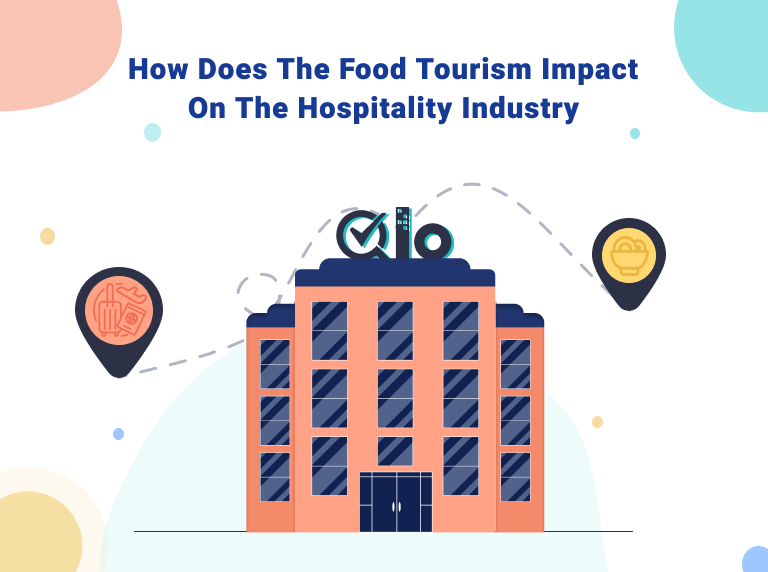Food tourism refers to the act of traveling to enjoy and explore the different culinary offerings and traditions in various places.
As travelers increasingly seek out unique and authentic food experiences. The hospitality industry has been greatly impacted by food tourism. In this blog, we will discuss How Does The Food Tourism Impacts On The Hospitality Industry.
What is the Food Tourism?
Food tourism goes beyond just fulfilling hunger. It is about digging into the cultural and social aspects of a place through its food. It allows the travelers to engage with the local attractions. Learn about classic cooking styles and the importance of certain ingredients or dishes in the local culture.
Food tourism can take many forms based on the likes and interests of the traveler. Some may embark only on food-focused trips to explore the culinary offerings of a specific region or country. And some may include food in their overall trip. It can be a solo tour, a group tour, or even a part of organized food festivals and events.
Overall, food tourism has become a significant trend in the travel industry. It changes the way people explore and enjoy different foods and contributes to the economic and cultural growth of the place.

How Does The Food Tourism Impact On The Hospitality Industry?
Economic Boost
Food tourism has proven to be an effective economic driver for the industry. Travelers who embark on food-focused trips more often spend a large part of their budget only on the food and stay.
This trend has led to the growth of new firms. Such as food tours, cooking classes, and food-related events. As a result, it contributes to job creation and boosts local economies.
With the rise of food tourism, there has been a growing demand for unique and authentic culinary affairs. Delis and hotels have recognized this trend and responded by offering some unique dining options. Such as farm-to-table, chef-led tasting menus, and food and wine pairing events.
This focus on culinary merit has exalted the overall dining experience. It also inspired the firms to innovate and show the local flavors and ingredients.
Destination Selection
Food has become a key factor in the destination choice for many travelers. Regions famed for their culinary origin and local cooking have seen a surge in tourism.
This has poked the regions to promote their unique food offerings as a way to contrast themselves from their rivals. By using their local food identity. The destinations can attract a specific part of travelers and position themselves as food-centric hotspots.
Collaboration and Partnerships
Food tourism has fostered partnerships between distinct partners in the industry. Cafes, hotels, local producers, and tourism boards have come together to create food-focused ambitions. i.e., food festivals, culinary trails, and food markets.
These partnerships not only improve the overall guest experience but also boost the local food ecosystem by supporting local producers and suppliers.
Sustainability and Responsible Food Practices
Food tourism has also brought attention to the importance of sustainability and responsible food practices. Travelers are increasingly conscious of the natural and social impact of their food choices. Hence, increase the demand for locally sourced ingredients, organic produce, and sustainable farming practices.
In response to this, delis and hotels are adopting sustainable practices, reducing food waste, and promoting ethical sourcing, aligning themselves with the values of eco-conscious travelers.
Digital Influence
The rise of social media and online platforms has vastly influenced the food tourism and its impact on the industry. Travelers now often rely on platforms like Instagram, food blogs, and review sites to find and share their culinary experiences.
This digital exposure has allowed delis and hotels to show their offers and attract guests in a large amount. It has also raised the importance of online reputation management for firms. As positive reviews and visually pretty food content can greatly impact their visibility and popularity.
Conclusion
In conclusion, food tourism has had a great impact on the industry. It drives economic growth, boosts culinary creation, improves destination branding, and fosters collaboration with the locals.
As food tourism continues to evolve, the industry must remain flexible. By embracing the demands of food-seeking travelers and providing the best culinary experiences that leave a great impression. By doing so, the industry can thrive and contribute to the ever-evolving world of food tourism.
Get In Touch With Us!
If you are a hotel owner looking for hotel booking software. Then QloApps: Free hotel booking software can help you.
QloApps offers various features to enhance your hotel business. Such as Virtual tours, Tours and Packages, Channel Manager, Front Desk, Cloud PMS, 100+ Add-ons, and many more.
To get started with this user-friendly software. Just download it and add your property on QloApps.
If you have any suggestions, you can share them on the QloApps forum.
For any technical assistance, kindly raise a ticket.

Be the first to comment.